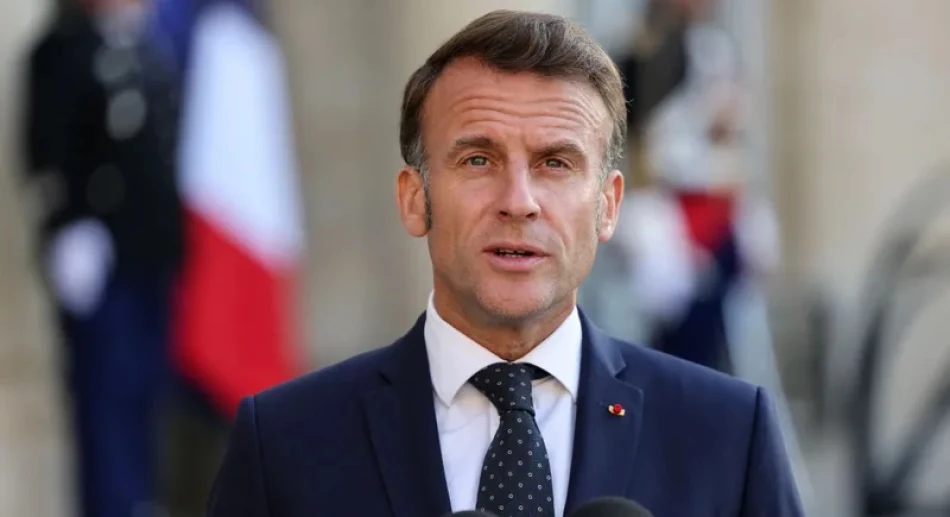
French Presidency Warns Israel's West Bank Annexation is a Clear Red Line
France Draws Red Line on West Bank Annexation as 10 Nations Prepare Palestinian Statehood Recognition
France has escalated diplomatic pressure on Israel by declaring West Bank annexation a "clear red line" while coordinating with nine other Western nations to formally recognize Palestinian statehood. The move represents the most significant European diplomatic challenge to Israeli policy in decades, with President Emmanuel Macron set to announce France's recognition at a high-profile UN conference alongside Saudi Crown Prince Mohammed bin Salman.
A Coordinated Western Response
The French presidency confirmed that ten nations—France, Britain, Australia, Canada, Belgium, Luxembourg, Portugal, Malta, Andorra, and San Marino—will participate in Monday's New York conference on the sidelines of the UN General Assembly. This coordinated approach signals a fundamental shift in Western diplomatic strategy, moving beyond individual statements to collective action.
Macron's announcement, scheduled for 3 PM New York time, will mark France's formal recognition of Palestinian statehood. The timing is deliberate: recent Israeli officials' threats to annex occupied West Bank territories have prompted this Western coalition to act decisively rather than continue with diplomatic warnings.
Strategic Partnership with Saudi Arabia
The conference's co-presidency between Macron and Saudi Crown Prince Mohammed bin Salman represents a significant diplomatic alignment. Saudi Arabia's participation via video link underscores the growing convergence between European and Gulf Arab positions on Palestinian statehood—a development that could reshape Middle Eastern diplomacy.
Breaking Decades of Diplomatic Precedent
This recognition wave breaks from the traditional Western approach of conditioning Palestinian statehood on negotiated settlements. Unlike Norway's recognition of Palestine in 2011 or Sweden's in 2014, this coordinated effort involves major NATO allies and EU founding members, giving it unprecedented weight in international law and diplomacy.
The inclusion of Australia and Canada—traditionally strong Israeli allies—signals how significantly regional dynamics have shifted. These nations have historically aligned closely with US Middle East policy, making their participation particularly notable.
Economic and Geopolitical Implications
For international markets, this diplomatic shift carries several implications. European companies operating in Israeli settlements may face increased legal and reputational risks as these territories' status becomes more contested in international law. The coordination with Saudi Arabia also suggests potential changes in regional economic partnerships and energy relationships.
The timing coincides with broader realignments in global trade relationships, as Western nations seek to diversify partnerships beyond traditional frameworks. Recognition of Palestinian statehood could facilitate new economic corridors through the Middle East, particularly if it leads to eventual conflict resolution.
Comparing Global Recognition Patterns
Currently, 139 of 193 UN member states recognize Palestine, but most major Western economies have withheld recognition. This coordinated move by ten Western nations could trigger a domino effect, similar to how recognition of Kosovo spread rapidly among Western allies after initial US and European recognition.
Unlike previous recognition waves that followed successful independence movements, this Palestinian recognition comes amid active conflict, making it more politically charged but potentially more impactful in shifting international legal frameworks.
Strategic Calculations Behind the Move
France's "red line" warning on West Bank annexation reflects growing European frustration with settlement expansion and recent Israeli policy directions. By coordinating with allies, Paris aims to create diplomatic consequences that individual nation protests could not achieve.
The Saudi partnership adds crucial regional legitimacy and suggests broader Arab-European coordination on Middle East policy. This alignment could pressure other regional players to clarify their positions and potentially influence US policy calculations ahead of future diplomatic initiatives.
This recognition initiative represents more than symbolic diplomacy—it signals a fundamental Western reassessment of Middle East policy frameworks that have guided international relations for decades. Whether it leads to renewed peace processes or further diplomatic polarization will depend largely on how other major powers, particularly the United States, respond to this coordinated challenge to existing policy consensus.
Most Viewed News

 Sara Khaled
Sara Khaled






